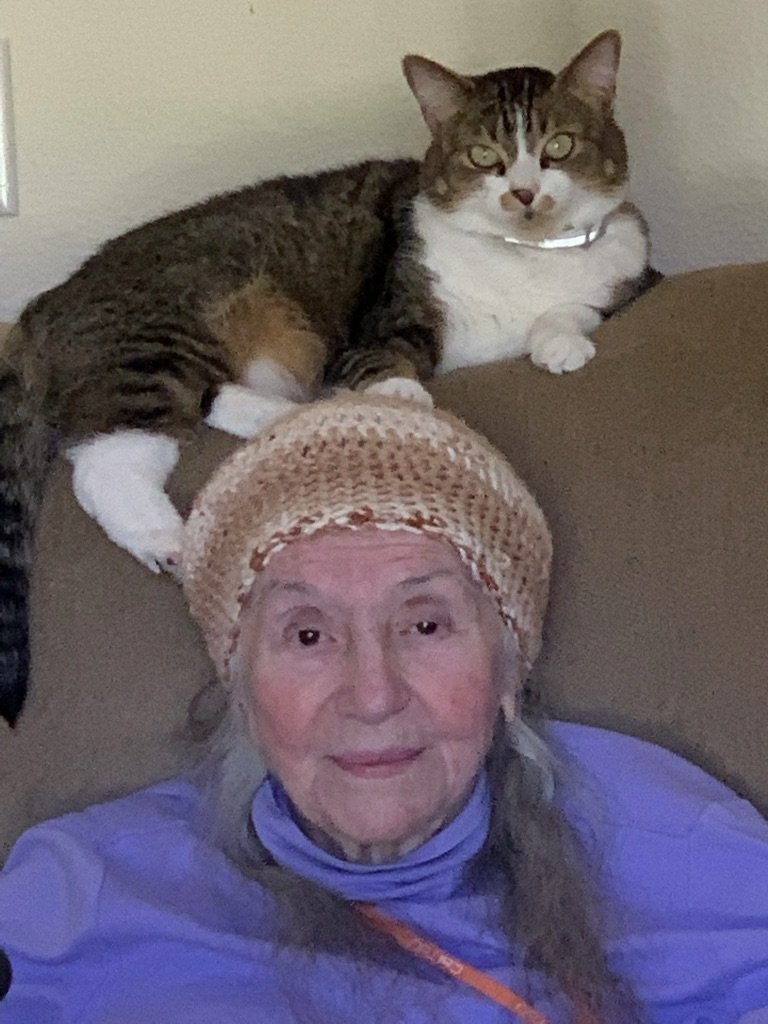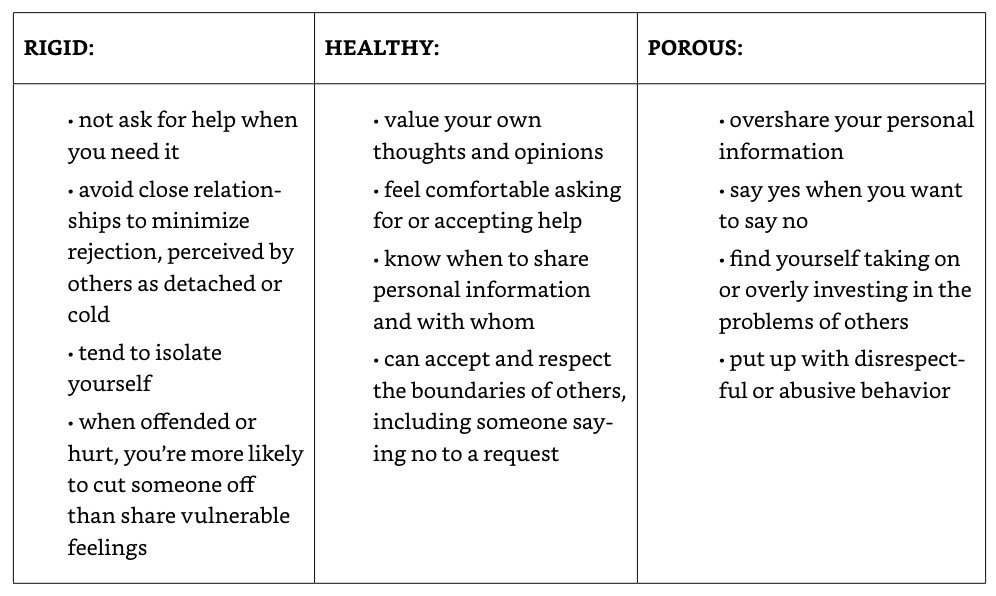Building Better Boundaries
The holiday season, which can often feel hectic and overwhelming, is a great time to spotlight the importance of setting healthy boundaries. To me, this means making my physical and emotional needs a top priority, which includes choosing to advocate for them rather than abandon myself. It means being brave enough to say no, which requires a willingness to face negative reactions and pushback. It means working to break free from the entrenched people-pleasing patterns I’ve had for as long as I can remember.
Setting healthy boundaries is an act of self-love and self-respect, and the rewards are significant, including more joy and better health. Best-selling author, Dr. Gabor Maté, writes in his newest book, The Myth of Normal, that in his multi-decade career as a medical doctor, he’s observed an indisputable link between the following self-sacrificial personality traits and all types of chronic illnesses:
“An automatic and compulsive concern for the emotional needs of others, while ignoring one’s own.”
“A rigid identification with social role, duty, and responsibility.”
“Overdriven, externally focused multitasking hyper-responsibility, based on the conviction that one must justify one’s existence by doing and giving.”
“Repression of healthy, self-protective aggression and anger.”
“Harboring and compulsively acting out two beliefs: ‘I am responsible for how other people feel’ and ‘I must never disappoint anyone.’”
Dr. Gabor asserts that no one is born with these characteristics. “If you’ve ever met a newborn infant,” he writes, “You know they have zero compunction about expressing their feelings, nor do they think twice before crying lest they inconvenience someone else.” The problem, he says, is that these “dangerously self-denying” traits are usually regarded by our society as admirable strengths rather than potential liabilities. They get confused with healthy attributes, such as compassion, honor, diligence, loving kindness, and generosity.
Personally, when it comes to my own boundary setting skills, I’m still a work in progress, especially when it comes to my mother. At 95, my mom is often lonely, frustrated, and fed up with life, especially now that she is no longer able to stand or walk. In her ideal world, I would spend every afternoon with her at her assisted living home. She’s always letting me know that my one-hour visits three or four times a week feel paltry, and I’m always feeling pressured by both compassion and guilt.
Myra’s mother Edith with her cat Bubbaleh, February 2022
Because I’m not yet able to set and keep firm boundaries with a clear conscience, when I learned that Terri Cole—the wise psychotherapist who authored The Boundary Boss—just released a companion workbook, I knew it would be a valuable refresher.
In her new workbook, Terri explains that many of us have weak boundaries because from an early age we were conditioned to focus outside of ourselves on the wants and needs of our caretakers as we instinctively tried to secure their love and approval. Focusing on what was going on inside of us—our own wants and needs—was never a top priority. As we grew to adulthood, this behavior was continually reinforced. “Over and over we’re told that being kind, generous, nice, and self-sacrificing is desirable, and having strong boundaries makes us self-absorbed, dramatic, or mean.”
Terri believes that the ability to set and communicate clear, healthy boundaries is a prerequisite to creating a healthy, happy, self-determined life, and she’s passionate about teaching those essential skills to those of us that need assistance. Here are seven insights from her workbook that I found particularly helpful and illuminating:
1) Boundaries strengthen relationships.
Terri is convinced that healthy love always requires healthy boundaries, and that not setting boundaries often traps us in unhealthy patterns that leave us feeling exhausted and resentful. She reminds us that if we really want something from someone, we can’t leave it unexpressed. “When you leave things unspoken, you’re setting yourself up to feel disappointed and frustrated when people don’t meet your expectations. No one can read your mind, and it’s not fair to expect them to.” She encourages us to start telling the truth about how we feel. “Directly saying no and drawing a boundary isn’t just protecting you, but it’s also allowing people to know you.”
2) Boundaries are a two-way street.
When we think about boundaries, it’s usually from the perspective of setting and maintaining them, but being good at boundaries includes being able to accept and respect other people’s boundaries as well. How we respond to the boundaries we come up against can teach us that it’s no one’s job to make everyone feel good all the time, and that we are all responsible for our own feelings.
Terri also points out that many of us who have a hard time setting healthy boundaries are often guilty of crossing them. “If you have weak emotional boundaries, you might feel compelled to ‘fix’ things for the people around you or give unsolicited advice or spontaneous criticism… This behavior can be well-intentioned, but it can also be intrusive and frustrating for the receiver.” She advises us to stop being an “auto-advice” giver, and instead ask more open-ended questions and become better at listening.
Boundary Types
From "The Boundary Boss Workbook", by Terri Cole MSW LCSW
3) We must learn to tolerate discomfort.
Once we set a boundary, a person’s negative reaction—or our own guilt or fear of judgment or rejection—may make us second-guess ourselves and want to backtrack. Terri urges us not to take any action in terms of un-doing our boundary for at least 24 hours. Instead, she advises us to stop focusing on the other person, and turn our attention back to ourselves.
“Change can be scary, and anticipation of people’s reactions can leave you reeling. If you can expect to be uncomfortable after setting a boundary, you will not be blindsided or sent into a panic when you feel post-boundary-setting anxiety. Learning to sit with your discomfort and not react too soon is essential to your boundary-setting success.”
4) We should plan ahead.
Negotiating for boundaries is a skill we can all master. Cautioning us to always avoid an “insta-yes” when we receive a request, Terri says it’s important to have some lines ready that buy us time, such as, “I’m not sure if I’m available. I’ll get back to you soon.” Sometimes our answer will be a simple yes or no, but often we can set boundaries by including stipulations or limits, such as, “Yes, I’m happy to babysit on Friday, but I’m only available between 2:00 PM and 5:00 PM.”
While we should practice saying no with as little justification as possible, it’s always helpful to start a reply by expressing empathy, appreciation, or gratitude, such as, “I really appreciate the invitation, but unfortunately, I can’t make it.” Setting boundaries can always be done with kindness, and being prepared helps us navigate requests with more compassion and grace.
5) We can cultivate bravery.
Terri wants everyone to understand that protecting our boundaries does not make us selfish—but it does make us brave. She offers an exercise called “If I were brave…” to help gain clarity on what we truly desire, and to give us the opportunity to flex our “courage muscles” by using our imagination. “This exercise gives you the freedom to try on a feeling state (like being brave) without the threat of having to take any immediate action. Approach it like a fun game. Allow yourself to get expansive, use your imagination, and tap into your truest heart’s desires.”
Whether it’s with friends, family, a romantic partner or a boss, Terri asks us to write down what we would do or say if we weren’t stifled by fear or guilt by using the prompt, If I were brave, I would . . . “Don’t put pressure on yourself to do anything immediately—simply visualize and feel the feelings of having those things become your reality.”
6) We should listen to our body’s messages.
Our bodies are constantly sending us signals that can help us wake up to what we’re truly feeling. “Whether it is a gut feeling, heart racing, or even a headache, your body’s reactions hold the answers to your mind’s questions,” writes Terri, who says that most of us have been socialized to second-guess our feelings. “The more you understand and honor the gems of wisdom from your brilliant body, the easier it will be to know where you need to establish a boundary by setting a limit or making your preferences clearly known.”
Our body’s signals also can help us set boundaries with ourselves. For me, this often means not overriding my need to rest, or not exposing myself to more news than I can comfortably handle. When we consistently honor healthy internal boundaries that support our own well-being, the firmer and more confident we will become when advocating for ourselves with other people.
7) We should know our rights, and protect them.
Terri offers a wonderfully liberating “Boundary Bill of Rights” that she suggests verbalizing aloud in the first person, so it becomes a powerful positive affirmation (“I have the right…”)
Boundary Bill of Rights
1. You have the right to say no (or yes) to others without feeling guilty.
2. You have the right to make mistakes, to course correct, or change your mind.
3. You have the right to negotiate for your preferences, desires, and needs.
4. You have the right to express and honor all of your feelings if you so choose.
5. You have the right to voice your opinion even if others disagree.
6. You have the right to be treated with respect, consideration, and care.
7. You have the right to determine who has the privilege of being in your life.
8. You have the right to communicate your boundaries, limits, and deal-breakers.
9. You have the right to prioritize your self-care without feeling selfish.
10. You have the right to talk true, be seen, and live free.
Terri cautions that if we deny ourselves the right to change our minds—or if we can’t speak up or say no—a decision can end up carrying the weight of a life sentence. “Give yourself permission to be the one who makes decisions for you,” she urges.
For people looking for more help developing boundary-setting skills, here are a few additional resources:
Terry Cole’s podcast
Terry Cole’s Boundary Boss book and workbook
Myra’s Spirituality & Health magazine article on strengthening porous boundaries from the inside out, featuring wisdom and a guided meditation from Wendy De Rosa.
Take a Moment Micro-Meditation
Tiny pauses to be right here, right now can have big results. Visit and bookmark our library of twenty Take a Moment micro-meditations—all under two minutes long— that make taking mindful pauses as easy as possible. We invite you to "Take a Moment" to find the calm that is always within you.





